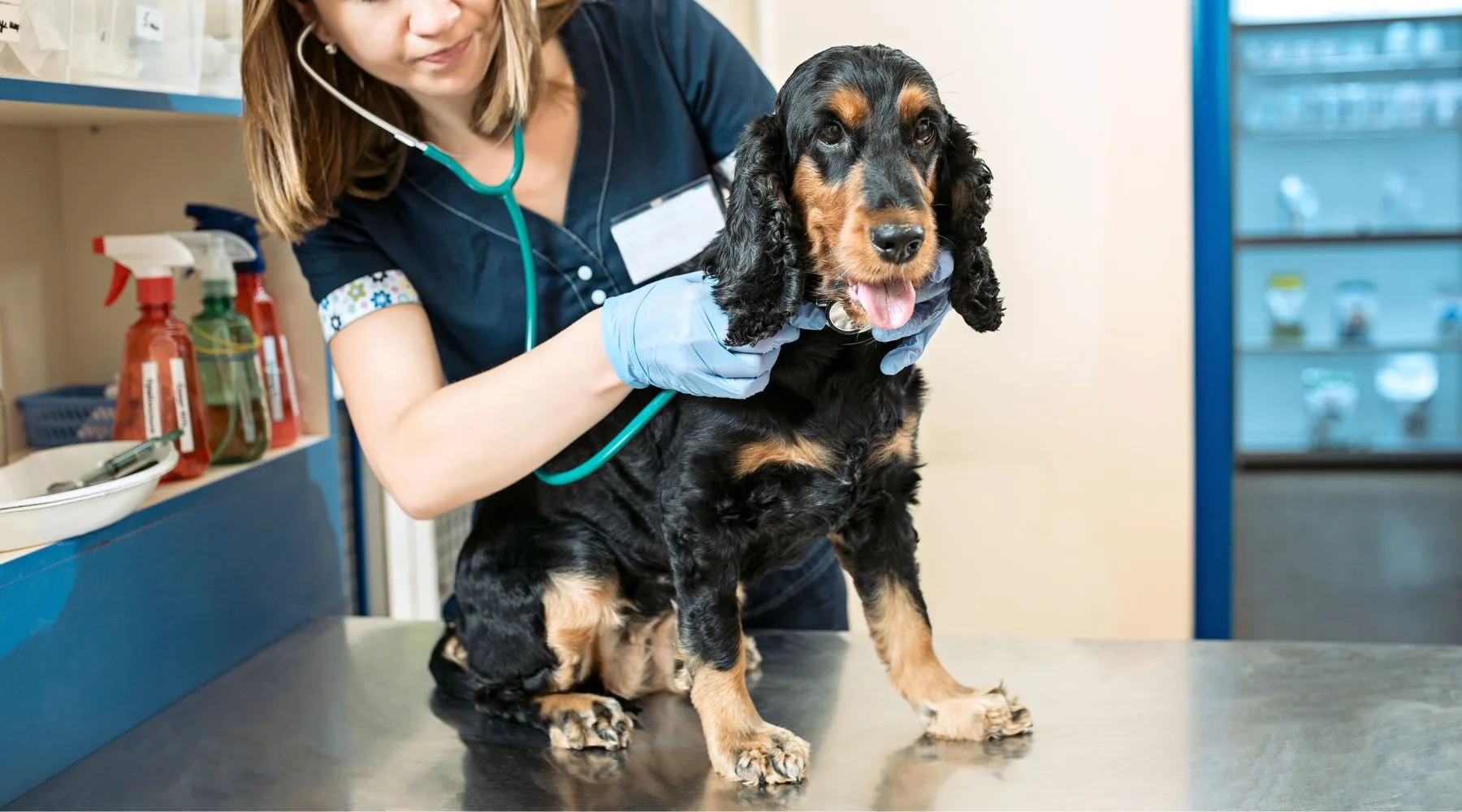5 questions to ask at your next vet visit

We've prepared some important topics for you to discuss with your vet, so you can get the most out of your next visit and keep your doggo wagging their tail.
This content has been sponsored by an advertiser and written by the Finder editorial team.
Visiting the vet can be daunting - but it's an essential part of caring for your furry friend. There are many health conditions that our pets can develop, often without us even knowing.
I mean, they are a whole different species!
In case anything happens it's important to know what steps you can take to be proactive about managing their health so you know what to look out for. So before you take them for their next check-up, make sure you're prepared with the right info.
1. How can I proactively protect my dog from paralysis ticks and fleas?
Paralysis ticks and fleas are some of the most common problems our pets can come into contact with when out and about, or even at home in their backyard.
Unfortunately, with parasites, a seemingly little nuisance can turn into a serious health problem if your pet isn't properly protected.
There are very few places in Australia where there are no fleas, and with our scorching sun, it's not surprising to find fleas all year round.
Paralysis ticks are one of the most dangerous parasites and most commonly found along the eastern seaboard of Australia. Just one tick is capable of causing paralysis and even death, so pet owners need to be extra vigilant to protect their pet. Gaps in protection can happen when flea and paralysis tick treatments aren't administered at the correct intervals.
That's why it's a great idea to give your pet year-long protection from paralysis ticks and fleas. Using a preventative treatment that provides long-lasting protection is a convenient way to protect your loving sidekick and get yourself some peace of mind.
Many vets now offer long-lasting protection against fleas and paralysis ticks. If you have any questions about dosage or what's best for your pet, speak to your vet for more information. Contact your local veterinary clinic to discuss long-lasting flea and paralysis tick protection that would be best suited to your dog.
2. Should I get pet insurance for my dog?
Medical treatment for humans and pets is expensive. In Australia, we are fortunate to have our medical costs subsidised by Medicare. Unfortunately, Veticare (Medicare for pets) does not exist! However, pet insurance can offer a practical alternative.
Comprehensive plans usually include surgery, hospital visits and medicine costs - with benefits reaching up to $30,000 per year.
Most pet insurance is designed to help with unexpected and expensive events, however, it can also help with routine visits if that's available in your coverage. There are a range of pet insurance providers within Australia, and it is recommended to compare different policies to find the right coverage to suit your individual dog's needs.
If you're unsure whether your pet's covered for a particular procedure or treatment, check with your provider and vet.
3. How often should my dog visit the vet?
The frequency of veterinary visits will typically depend on the life stage of your pet. Just like us, our pets will need more frequent veterinary visits as puppies and as they head into their twilight years.
Remember, our pets age faster than us, and regular bi-annual to annual veterinary health checks are recommended, regardless of life stage.
Regular veterinary health checks give you an opportunity to discuss individual requirements for your dog such as:
- Vaccinations
- Nutrition
- Behaviour
- Parasite preventatives.
It also permits a nose-to-toe physical examination of your pet, which could detect underlying diseases or health concerns.
Contact your veterinarian to discuss the benefits of a health check for your dog.
4. How do I know if their teeth are okay?
Just like us humans, our furbabies can develop oral disease – most importantly periodontal or gum disease caused by the buildup of plaque and tartar. Without proper dental care, your dog could show signs of oral disease from three years of age and onwards.
With your help, your dog can have healthy teeth and gums throughout their lives by:
- Feeding a good diet as recommended by your veterinarian
- Good quality dental chews as treats
- Regular brushing at home - your veterinarian can demonstrate this
- Yearly dental check ups by your veterinarian
It is best to speak to your veterinarian about your dog's dental care, as well as potential signs to look out for when their mouth isn't healthy.
5. Are there any household dangers that could cause toxicity or ill-health to my dog?
Just as parents 'childproof' their homes, pet owners should also attempt to "pet-proof" theirs. Like infants and small children, dogs are naturally curious and explore their environment using their paws, nose and mouth.
However, dogs don't know what is dangerous and what is not, and ingestion or exposure to certain common household items can cause serious illness.
Some common household dangers include:
- Human foods such as chocolate, alcohol, corn on the cob and grapes
- Outdoor plants, like Brunfelsia (Yesterday Today & Tomorrow), Lilies, Ivy, Oleander, Azalea, Foxglove, Hydrangea, Morning Glory, Nightshade, Rhododendron, Yew and many more can be poisonous to pets.
- Medicines, shampoo, sunscreen and other personal care items
- Speak to your veterinarian about the best ways to "pet-proof" your home or if you have any questions about other potential household dangers.
